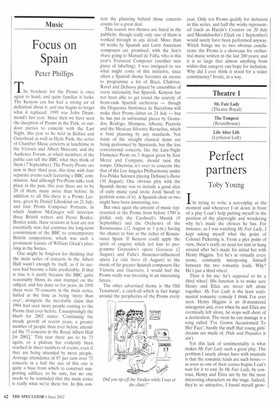Focus on Spain
Peter Phillips
The brochure for the Proms is once again to hand, and quite familiar it looks. The Kenyon era has had a strong air of definition about it, and one begins to forget what it replaced: 1995 was John Drummond's last year. Since then we have seen the inception of Proms in the Park, or outdoor parties to coincide with the Last Night, this year to be held in Belfast and Gateshead as well as Hyde Park; the series of Chamber Music concerts at lunchtime in the Victoria and Albert Museum; and the Audience Forum, at which members of the public can tell the BBC what they think of them (7 September). The Poetry Proms are now in their third year, this time with four separate events each featuring a BBC commission. And although Pre-Prom talks took place in the past, this year there are to be 20 of them, many more than before. In addition to all this there is a Proms Lecture, given by Daniel Libeskind on 21 July; and four Proms Composer Portraits, in which Andrew McGregor will interview three British writers and Pierre Boulez. Boulez aside, these sessions at least are not essentially new, but continue the long-term commitment of the BBC to contemporary British composition, which was such a prominent feature of William Glock's planning in the Sixties.
One might be forgiven for thinking that the main series of concerts in the Albert Hall wasn't enough by itself, as if its success had become a little predictable. If that is true it is partly because the BBC quite reasonably blows its own trumpet on the subject, and has done so for years. In 1995 there were 70 concerts in the main series, hailed at the time as being 'more than ever', alongside the inevitable claim that 1994 had seen more people coming to the Proms than ever before. Unsurprisingly the blurb for 2002 states: 'Continuing the steady growth of recent years, a greater number of people than ever before attended the 73 concerts in the Royal Albert Hall [in 2001].' This year there are to be 73 again, so a plateau has evidently been reached in sheer numbers of events, even if they are being attended by more people. Average attendance of 87 per cent over 73 concerts in a hall the size of this one is quite a base from which to construct supporting edifices, to be sure, but no one needs to be reminded that the main series is really what we're there for. In this con
text the planning behind those concerts counts for a great deal.
This season two themes are listed in the publicity, though really only one of them is worked through in any detail. More than 60 works by Spanish and Latin American composers are promised, with the lion's share going to Manuel de Falla, who is this year's Featured Composer (another new piece of labelling). I was intrigued to see what might come of this initiative, since often a Spanish theme becomes an excuse to programme a lot of Bizet, Chabrier, Ravel and Debussy played by ensembles of every nationality but Spanish. Kenyon has not been able to get round the scarcity of front-rank Spanish orchestras — though the Orquestra Simfonica de Barcelona will make their Proms debut on 24 July — but he has put in substantial pieces by Granados, Rodrigo, Mompou, Albeniz, Piazzola and the Mexican Silvestre Revueltas, which is bold planning by any standards. Not many of the straight classical items are being performed by Spaniards, but the less conventional concerts, like the Late-Night Flamenco Prom on 3 August given by Jose Merce and Company, should raise the tempo. Otherwise it's over to concerts like that of the Los Angeles Philharmonic under Esa-Peklca Salonen playing Debussy's Iberia (30 August). One obvious ploy with the Spanish theme was to include a good slice of early music (and invite Jordi Sava11 to perform some of it). A Spanish choir or two might have been interesting, too.
But once again the amount of music represented at the Proms from before 1700 is pitiful, only the Cardinall's Musick (9 September) and the Orchestra of the Renaissance (12 August at 1 p.m.) having the chance to hint at the riches of Renaissance Spain. If Kenyon could apply the spirit of enquiry which led him to programme Granados's opera Goyescas (2 August) and Fa!la's flamenco-influenced opera La vida breve (8 August) to the music of far greater Spanish composers like Victoria and Guerrero. I would feel the Proms really was investing in an interesting future.
The other advertised theme is `the Old Testament', a catch-all which in fact hangs around the peripheries of the Proms every year. Only ten Proms qualify for inclusion in this series, and half the works represented (such as Haydn's Creation on 20 July and Mendelssohn's Elijah on 1 September) would surely have been performed anyway. Which brings me to two obvious conclusions: the Proms is a showcase for orchestral music written in the last 200 years; and it is so large that almost anything from within that category can hope for inclusion. Why did I ever think it stood for a wider constituency? Ironic, in a way.






















































































 Previous page
Previous page